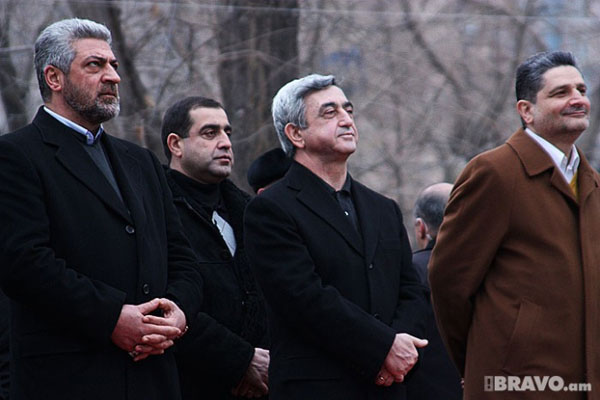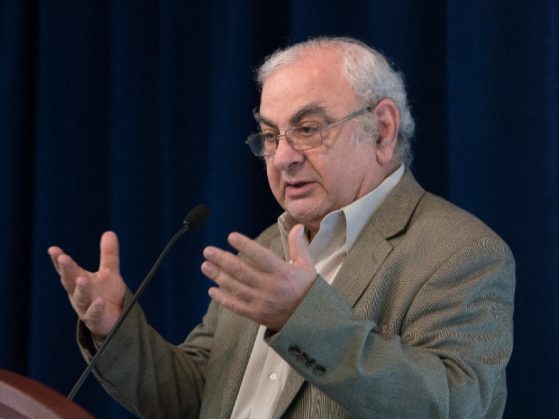
Every spot in the world has relative geopolitical importance in the eyes of those actors (national, international, social, economic etc.) that have an interest there at that spot in one form or another. And with the end of the Cold War, South Caucasus emerged as one of those spots, where both regional as well as international actors displayed great interest in the potential of the region or concern, the potential either to become a region of prosperity and cooperation or the concern to become a major source for instability and insecurity for the region and beyond.
This relative importance has not changed. But the relations in and beyond the region have significantly improved. What we have today -and it is also the subject of our discussions throughout the day- is a cooperation mechanism that possess a potential to do good not only for the three countries involved in it, but also those that see the geopolitical importance of the region. Thus, we have probably the best and most efficient cooperation mechanism available in the region: Turkey-Azerbaijan and Armenia.
What I would like to mention today is a view from Turkey with regard to the increasing importance of the region and this trilateral cooperation from a rather different perspective.
Turkey saw itself the easternmost of the west for a long time, during the cold war. But with the end of the Cold War Turkey began to change its position, assess the potential in the emerging neighborhood and the East and gradually adapt to it. The initial assumption that the post-Soviet geography was left with a power vacuum and that it would be filled with a great power competition seems to prove right up until today. The South Caucasus region, as well as the Caspian and Central Asia, now extending to the east till China, its resources and geopolitical importance invokes such processes of competition, and cooperation thereof.
In that context, Turkey’s position slowly transformed into becoming the westernmost of the east, with ambitions, goals and a carefully defined vision.
Such a repositioning is important because facing the West while cooperating with the east has been new modern Turkey’s goal from the beginning. But the conditions set forth by the Cold War forced Turkey to face east, being the southern flank of the Atlantic alliance and therefore its relationship with Europe and the Transatlantic alliance could not have been different from a predestined course, as is the case with most of the actors in such a bilateral international system.
Today, the gravity of the world's economic growth and production is shifting from West to East. Regional powers and outside actors, such as the United States, the European Union, Japan, Russia and others, have developed many projects to engage with countries in Eurasia in a framework to strengthen regional cooperation. Having direct connections with Iran, Russia, the Black Sea region, China and Europe via Turkey, Eurasia stands at the crossroads of old and emerging transportation corridors. Recently, with China's increasing interests in connectivity projects, such as the New Silk Road and the One Belt One Road (OBOR) initiative, the importance of Eurasia has again been drawing the attention of many actors that particularly focus on the fields of energy transportation and the establishment of trade routes.
In such a context, Turkey-Georgia-Azerbaijan trilateral cooperation is now of more critical than ever.
The connectivity is the key term here.
The trilateral cooperation presents a working connectivity mechanism that already help link the three countries in a “one belt and one road” of this region. This mechanism realized three major projects -among others-, i.e. BTE natural gas, BTK oil and BTK railway projects, that have now been categorized under “Reconnecting Asia” label. The last one of those project that got realized, the BTK railway is one of the main connectors in transportation projects, such as the European Union-led Transport Corridor Europe-Caucasus-Asia (TRACECA) and the BRI, and it not only promotes the role of Turkey but also Azerbaijan, Georgia and even Kazakhstan, Turkmenistan and Uzbekistan. These uninterrupted lines will stretch from China to Europe and promote positive outcomes in relations based on cooperation. The trilateral cooperation has a lot to offer.
For instance, BTE natural gas pipeline, i.e. the South Caucasus pipeline, TANAP and now TAP, should be seen from the same perspective, that aims to connect the resources of the Caspian and beyond, with the means and vision not only to transport the resources of the region, but the goods and people together with further projects.
There are challenges to overcome with regard to the connectivity mechanism provided by these projects, such as standardizing technicalities in integration, building infrastructure and reaching a consensus on the legal status of the Caspian basin.
But again trilateral mechanism that already proved efficiency and value established by Turkey-Georgia and Azerbaijan, can serve as a multilateral harmonization and connectivity example for the projects to the east that will benefit all the parties including the European Union and China. Remember, Turkey has pioneered work on harmonization of customs and tariffs and measures to enhance smooth operation of the BTK railway within the framework of the Kervansaray Project that began in 2009, and Azerbaijan and Georgia have successfully adapted to the process. It shows the willingness to overcome the obstacles to further integration is one of the most important factors that made it possible to get going.
Thus, the regional trilateral mechanism is not limited to this region alone.
At this point, it must not be forgotten that in this illuminating picture of regional cooperation, we still cannot talk about the South Caucasus region as a whole. There is one country, i.e. Armenia, that is missing from this picture. I won’t be going into details, such as the reasons behind the lack of willingness, or independent political will, the economic potential, security perspective or the credibility of Armenia’s politics. But let me remind you of the fact that Armenia’s self-induced isolation does not stem from Armenia’s inability to establish bilateral or regional relations with its neighbors. It is more of an anomaly for western politics and a bad test of regional politics. Russia’s successful establishment of control over the strategic industries, its economy and its security (remember the Iskandar missiles) is also not the only problem. The problem is, even in the light of the problematic relation between Russia and the West, both sides have encouraged Armenian position of irreconciliation.
I believe, in this transregional outlook we tried to present here, Armenia’s isolationist position will be soon disregarded, furthering its domestic instability, pushing it towards Russia all the more and with its conflictual stance, and unquestioned support from outside the region, either in the form of developmental aid, or association agreement with the EU, invitation to NATO drills or ignoring its illegal occupation in Azerbaijan’s territories, will produce the opposite result of marginalizing Armenia further.
The trilateral mechanism between Turkey-Georgia-Azerbaijan possess incredible potential with a view to the East-West connection. I don’t think Armenia’s position does have a potential to hamper this regional mechanism; on the contrary, Armenia will be more and more adversely affected by it.
In conclusion, the trilateral cooperation between Turkey, Georgia and Azerbaijan is now looking to move beyond the South Caucasus region. Building on this experience, this mechanism can and should be focusing on its role as the “buckle” of the belt, through which the Eurasian region and its increasing potential meets the West.
© 2009-2025 Center for Eurasian Studies (AVİM) All Rights Reserved
No comments yet.
-
DIASPORA ARMENIANS AND THEIR INITIATIVES FOR COMPENSATION: THE REFLECTIONS OF THE MOVSESIAN CASE II
Aslan Yavuz ŞİR 29.02.2012 -
 NEW ZEALAND ATTACK AND THE ARMENIAN DIASPORA’S TRIAL WITH TERRORISM
NEW ZEALAND ATTACK AND THE ARMENIAN DIASPORA’S TRIAL WITH TERRORISM
Aslan Yavuz ŞİR 21.03.2019 -
 BAKALIAN CASE APPEAL HEARING HELD IN CALIFORNIA
BAKALIAN CASE APPEAL HEARING HELD IN CALIFORNIA
Aslan Yavuz ŞİR 08.02.2019 -
 SHATTERING OF A MYTH: DILEMMA OF ARMENIAN NARRATIVE
SHATTERING OF A MYTH: DILEMMA OF ARMENIAN NARRATIVE
Aslan Yavuz ŞİR 20.06.2017 -
 US PRESIDENT TRUMP’S STATEMENT
US PRESIDENT TRUMP’S STATEMENT
Aslan Yavuz ŞİR 26.04.2017
-
 AMBASSADOR WARLICK’S SIX POINTS REGARDING PEACE FOR NAGORNO-KARABAKH
AMBASSADOR WARLICK’S SIX POINTS REGARDING PEACE FOR NAGORNO-KARABAKH
Mehmet Oğuzhan TULUN 08.05.2014 -
AVIM HELD A MEETING ENTITLED “A GENERAL LOOK AT ASIA AND TURKEY'S PRIORITIES”
AVİM 12.06.2013 -
 ARMENIAN POLITICAL THINKING AND A SOBER WAKE-UP CALL BY GERARD LIBARIDIAN
ARMENIAN POLITICAL THINKING AND A SOBER WAKE-UP CALL BY GERARD LIBARIDIAN
AVİM 01.02.2021 -
 ARMENIA IS DISTURBED BY THE RADICAL ACTIVITIES IN THE DIASPORA
ARMENIA IS DISTURBED BY THE RADICAL ACTIVITIES IN THE DIASPORA
Hazel ÇAĞAN ELBİR 10.02.2023 -
 THE SPEECH OF ARMENIA’S PRESIDENT AT THE PARLIAMENTARY ASSEMBLY OF COUNCIL OF EUROPE
THE SPEECH OF ARMENIA’S PRESIDENT AT THE PARLIAMENTARY ASSEMBLY OF COUNCIL OF EUROPE
Tutku DİLAVER 06.02.2018
-
25.01.2016
THE ARMENIAN QUESTION - BASIC KNOWLEDGE AND DOCUMENTATION -
12.06.2024
THE TRUTH WILL OUT -
27.03.2023
RADİKAL ERMENİ UNSURLARCA GERÇEKLEŞTİRİLEN MEZALİMLER VE VANDALİZM -
17.03.2023
PATRIOTISM PERVERTED -
23.02.2023
MEN ARE LIKE THAT -
03.02.2023
BAKÜ-TİFLİS-CEYHAN BORU HATTININ YAŞANAN TARİHİ -
16.12.2022
INTERNATIONAL SCHOLARS ON THE EVENTS OF 1915 -
07.12.2022
FAKE PHOTOS AND THE ARMENIAN PROPAGANDA -
07.12.2022
ERMENİ PROPAGANDASI VE SAHTE RESİMLER -
01.01.2022
A Letter From Japan - Strategically Mum: The Silence of the Armenians -
01.01.2022
Japonya'dan Bir Mektup - Stratejik Suskunluk: Ermenilerin Sessizliği -
03.06.2020
Anastas Mikoyan: Confessions of an Armenian Bolshevik -
08.04.2020
Sovyet Sonrası Ukrayna’da Devlet, Toplum ve Siyaset - Değişen Dinamikler, Dönüşen Kimlikler -
12.06.2018
Ermeni Sorunuyla İlgili İngiliz Belgeleri (1912-1923) - British Documents on Armenian Question (1912-1923) -
02.12.2016
Turkish-Russian Academics: A Historical Study on the Caucasus -
01.07.2016
Gürcistan'daki Müslüman Topluluklar: Azınlık Hakları, Kimlik, Siyaset -
10.03.2016
Armenian Diaspora: Diaspora, State and the Imagination of the Republic of Armenia -
24.01.2016
ERMENİ SORUNU - TEMEL BİLGİ VE BELGELER (2. BASKI)
-
AVİM Conference Hall 24.01.2023
CONFERENCE TITLED “HUNGARY’S PERSPECTIVES ON THE TURKIC WORLD"









